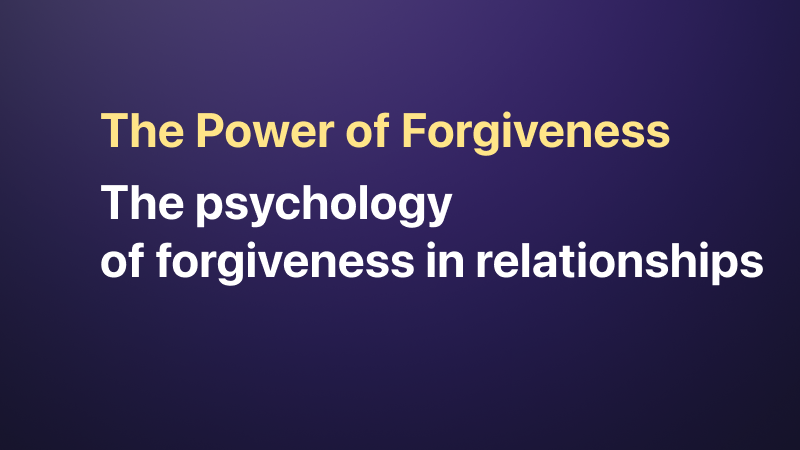Forgiveness in relationships can feel like one of the hardest things to do, especially when you’ve been hurt or disappointed. It’s like standing at a crossroads with one path leading to more resentment and the other to letting go—but which road do you choose? Forgiveness isn’t just about saying, “It’s okay” or sweeping things under the rug. It’s about releasing the grip of past hurts so you can both move forward with a lighter heart and a stronger connection. And here’s the kicker: forgiving doesn’t just heal the relationship—it heals you, too.
1. What Forgiveness Really Means (And What It Doesn’t)
Forgiveness isn’t about forgetting what happened or pretending it didn’t hurt. It’s not a free pass for bad behavior or an invitation to let people walk all over you. It’s about making a conscious choice to let go of resentment, anger, or the need to get even. Think of it as unclenching your fists so you can hold your partner’s hand again. It’s not about giving up your power; it’s about reclaiming it by choosing peace over grudges.
2. Why Forgiveness Matters in Relationships
Holding onto resentment is like carrying a heavy backpack filled with rocks. Each grudge, hurt, and unresolved conflict adds weight until it feels impossible to keep moving forward together. Forgiveness lightens that load, making space for empathy, trust, and connection. When you forgive, you’re not just doing it for your partner—you’re doing it for yourself. It’s about releasing the past to create a better future.
3. Steps to Forgiving (Without Losing Yourself)
Forgiveness doesn’t have to be an all-or-nothing deal. It’s a process, and everyone moves through it at their own pace. Here are some steps to help guide you through:
Step 1: Acknowledge the Hurt (It’s Okay to Feel It All)
Before you can forgive, you have to acknowledge what happened and how it made you feel. Ignoring your pain doesn’t make it go away—it just buries it deeper. Take a moment to sit with your feelings, whether it’s sadness, anger, betrayal, or disappointment. It’s okay to feel hurt; it’s part of being human.
Step 2: Communicate Your Feelings Honestly
When you’re ready, talk to your partner about what happened. Use “I” statements to express how you feel rather than pointing fingers. For example, “I felt hurt when…” rather than “You always…” This isn’t about blaming—it’s about sharing your experience. Honest communication opens the door to understanding and paves the way for healing.
Step 3: Decide If You’re Ready to Forgive
Forgiveness is a choice, not a demand. Ask yourself if you’re ready to let go of the hurt. It’s okay if you’re not there yet; sometimes, it takes time. But making the decision to forgive, even before you fully feel it, can be the first step toward emotional freedom.
Step 4: Let Go of Resentment (One Step at a Time)
Letting go doesn’t happen overnight. It’s a gradual process that often involves reminding yourself why forgiveness is important. When those feelings of anger or resentment bubble up, take a deep breath and refocus on what you want for the relationship moving forward. Each small step helps to release the hold of the past.
Step 5: Focus on Rebuilding Trust
Forgiveness and trust are different, but they often go hand in hand. After forgiving, work on rebuilding trust by setting clear expectations and communicating openly. Remember, trust is rebuilt through consistent actions over time, not grand gestures.
4. The Benefits of Forgiving (For You and Your Relationship)
- Emotional Freedom: Letting go of past hurts frees up mental and emotional space for positivity, joy, and connection.
- Stronger Bonds: Forgiveness fosters empathy and understanding, deepening your emotional connection.
- Better Communication: The process of forgiving often leads to more honest and open communication, making future conflicts easier to navigate.
- Healthier You: Holding onto anger and resentment can actually impact your physical health. Forgiveness reduces stress, improves heart health, and boosts your overall well-being.
Self-Reflection Question:
- What’s one past hurt I’m ready to start letting go of, and how can I take the first step toward forgiveness today?
Quiz: Are You Ready to Embrace Forgiveness?
-
How do you usually respond when your partner hurts you?
- A) I hold onto it and bring it up later
- B) I try to let it go, but it’s hard
- C) I address it, forgive, and move forward
-
How often do you revisit past arguments in your mind?
- A) Frequently—it’s hard to let go
- B) Sometimes—I’m working on it
- C) Rarely—I prefer to focus on the present
-
What’s your attitude toward forgiveness?
- A) It feels impossible for some things
- B) I know it’s important, but I struggle with it
- C) I see it as a way to heal and grow
Results:
- Mostly A’s: Forgiveness might feel tough right now, but remember it’s a process. Start small and focus on the benefits it can bring to you personally.
- Mostly B’s: You’re on the journey to forgiveness—keep going! A little patience and practice will help you get there.
- Mostly C’s: You’ve embraced the power of forgiveness and understand its role in healing. Keep nurturing that mindset.
Forgiveness isn’t about erasing the past; it’s about choosing to move forward without letting past hurts dictate your future. Embrace forgiveness as a tool to heal, grow, and strengthen your relationship, one step at a time.




